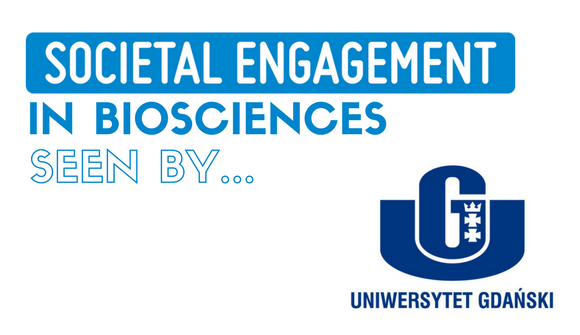
How do you understand Societal Engagement in biosciences research?
Scientists have a responsibility to engage in public dialogue about the implications of biosciences findings and to help distinguish between socially beneficial and socially harmful applications. The relation between science and society, including politics, is the base of social and economical development. The state decides about directions of development by legal and financial instruments, but it also suffers consequences of the lack of social acceptance of new technology. Bioscience is a cutting-edge area of science in which the pace of progress is perhaps faster than society’s capacity to deal with its ethical and social implications – therefore needs to be addressed properly.
What are the current standards and actions to achieve better Societal Engagement in your University and in your country?
State scientific policy is not consistent in defining the role and function of scientific communication. There is a great discrepancy between ambitious goals set for research units and academics in this area and financial support or the raising of the rank of activity in this field in the periodic assessment of a scientific unit or the processes of scientific career development.
Popularization of science is part of the Development Strategy of the University of Gdańsk until 2020 – in the field of strengthening of the university’s ties with the economic and social environment of Pomorskie.

What are you aiming for with the implementation of the STARBIOS2 actions towards better Societal Engagement standards for your institute?
The Intercollegiate Faculty of Biotechnology of University of Gdańsk and Medical University of Gdańsk (IFB) and its staff members and students engage in activities directed towards different target groups of non-specialists, especially to pupils, by organizing science dissemination events and various kinds of workshops for schools. With pilot actions within STARBIOS2 we aim at a strategic approach at IFB in the area of public engagement and increasing the effectiveness of the actions carried out.
What kind of actions are you going to establish to fulfill your objectives?
We focus on conducting information activities providing reliable information to society and increasing science literacy. Potential target groups include: school pupils, parents, elder people. The detailed information activity plan with specification of topic and related target group will be developed in cycles covering an academic year. After taking into account the experience and feedback gained, the plan for the next academic will be adopted. Potential channels for information activities are UG, IFB, STARBIOS2 AP UG website, social media, cooperation with local media, dedicated events.
Who is involved, from your University, in the AP in order to complete your final objective?
The STARBIOS2 Team at UG consists of staff members from biotechnology, social sciences, faculty, and administration. The team cooperates with numerous internal stakeholders, such as UG and IFB authorities, Technology Transfer Office, Science Office, UG Library, IFB researchers and scientists from other faculties, such as e.g. Social Sciences or other bioscience faculties.







